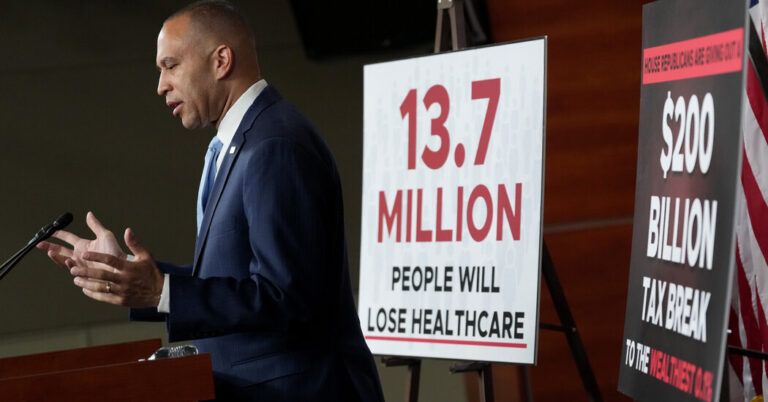On Sunday, the Republicans published their package of proposals to reduce federal expenditure in Medicaid and Obamacare. Shortly after, the Democrats and the left -wing organizations launched a torrent of press releases and publications on social networks, all with the same statement: that the legislet would cause 13.7 million Americans to become without insurance.
It is a surprising number: an almost as large figure as the number of Americans who would have lost coverage of lost coverage if the Republicans had managed to pass their third attempt to repeal Obamacare in 2017.
But in this case, the number is an exaggeration. The real number is approximately 8.6 million, not 13.7 million.
Here is where it comes from: Sunday night, the Democrats of the Energy and Commerce Committee published a letter from the Congress Budget office that summarizes the effects of the Legisllytation. The analysis considered the type of scenario of the budget office, often, the budget office concluded that the bill would mean that 8.6 million Americans less would have health insurance than the current law.
But because Democratic legislators had requested a second set of numbers, the budget office also supplied them. (The Budget Office, which works for Congress, routinely answers questions from legislators like this).
The Democrats asked the analysts to add the effects of the new provisions and The effects of another policy if it expires at the end of the year as scheduled. If you add the 8.6 million to the people who are expected to lose coverage when that policy expires, the budget office estimated that a total of 13.7 million people would not be safe.
It is that second analysis that resulted in the greatest number that many Democrats are now circulating.
Since the release of the bill, the boxes of Democratic legislators, including Patty Murray of Washington, the main Democrat in the Senate approval committee; Diana Degette de Colorado, the main Democrat of the Health Subcommittee of the Chamber of Energy and Commerce Committee; Bernie Sanders de Vermont, a classification member in the Senate Health, Labor, Labor, Labor and Pension Committee; and Dick Durbin de Illinois, the Senate’s democratic whip, have used the number of 13.7 million to assault the bill.
They have also done so of liberal defense and medical care groups, including the essential hospitals of the United States, Families USA, the Center for American Progress, Justice in Aging and the National Health Law Program. And several organizations that help manage and finance democratic political campaigns, including the campaign committee of the Democratic Congress, the Democratic Coalition and the majority PAC of the House of Representatives, have also used the number.
If you are interested in how insurance coverage could be seen in a decade if this bill became law, both are reasonable numbers to consider. But if you are interested in measuring the impact of the republican proposal specifically, the highest number is misleading.
Here is why: the disposition expired was written by Democrats; It was designed to expire after a few years. The Democrats approved the legislation to increase the generosity of Obamacare’s subsidies, first for a year as part of their Covid Stimulus bill, and then for a longer time as part of the inflation reduction law. Extending those subsidies for a longer period was exensive, and former Democratic senator Joe Cosin of West Virginia, a fiscal conservative and a crucial vote, said it would be for the bill, only if the general price was limited. As a result, subsidies were written in law only until the end of this year.
If Congress simply folded tomorrow and never approved any large budget bill, around 4.2 million people are expected to lose their insurance when the expiration occurred.
(If Congress did nothing, another estimate of 900,000 people is expected to lose the Obamacare coverage or a proposal regulation by the Trump administration).
Brett Guthrie de Kentucky, president of the Energy and Commerce Committee, who wrote the legislation, said in a statement that the Democrats were selling “incorrect reports that include policies that are not in the bill.”
“It is reclaus that my creagos, on the other side of the hall, demand an artificial high number in an alleged loss of coverage only so that they can be Fuarmonger and write down political points,” he said.
Mr. Guthrie can have the high ground here, but the Republicans in Congress are doing something spiritally similar when trying to extend tax cuts in other parts of the bill. They are using a maneuver known as the use of the “current policy baseline”, and budget experts throughout the political spectrum are extremely critical of the approach. (You can read some of your disapproval here in the form of metaphors).
When using a current policy baseline, Republicans try to get dark how many tax cuts will increase the deficit about time by ignoring the fact that current laws say they expire.
Democrats are now making a version of that argument. They are classifying the health insurance subsidies that expire as if they continue continuously indefinitely, only although they also have an imminent expiration date.
If any of the policies expires, there will be significant consequences. Few people enjoy paying higher taxes, and the expiration of tax provisions will feel as a tax increase in the lack of collection. Similarly, Improved Obamacare subsidies have made health insurance significantly more affordable for many Americans and helped contribute to an almost duplication of records in recent years. If they disappear, health insurance will be more extent for millions of people, and some of them will decide that they simply cannot pay it.
The Democrats would like if the Republicans extended those insurance subsidies and prevent those people from losing their coverage. But that does not mean that the Republican bill makes them expire. And that means that the estimate of 8.6 million is a fairer way to measure the effects of the Republican Plan itself.


